Analysis of a Leader: Nelson Mandela
VerifiedAdded on 2023/06/07
|16
|4081
|425
AI Summary
This paper analyzes the leadership traits of Nelson Mandela, including influential, goal-oriented, cultural-based, and visionary leadership. It also discusses the importance of global leadership knowledge and gives recommendations for future leaders.
Contribute Materials
Your contribution can guide someone’s learning journey. Share your
documents today.
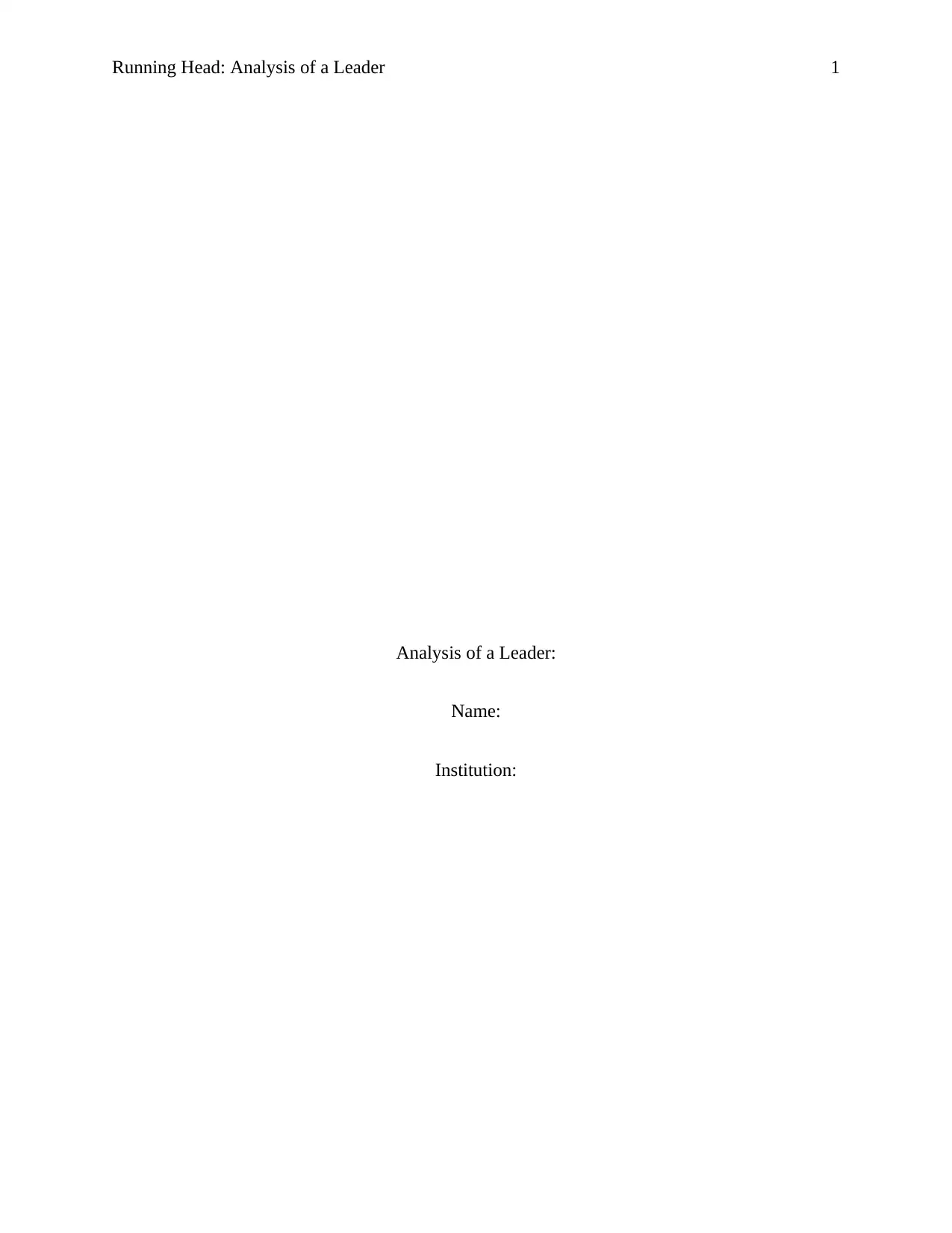
Running Head: Analysis of a Leader 1
Analysis of a Leader:
Name:
Institution:
Analysis of a Leader:
Name:
Institution:
Secure Best Marks with AI Grader
Need help grading? Try our AI Grader for instant feedback on your assignments.
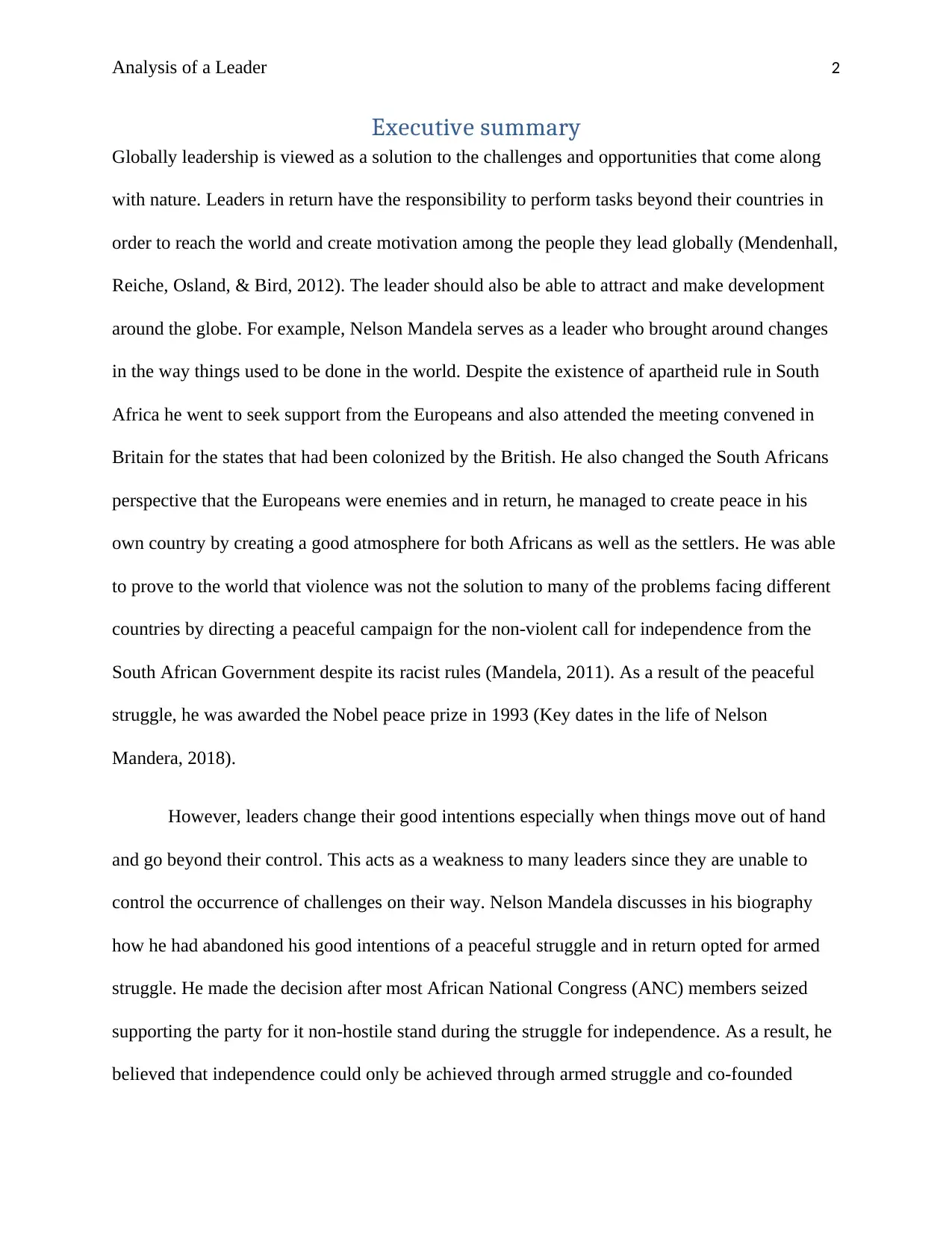
Analysis of a Leader 2
Executive summary
Globally leadership is viewed as a solution to the challenges and opportunities that come along
with nature. Leaders in return have the responsibility to perform tasks beyond their countries in
order to reach the world and create motivation among the people they lead globally (Mendenhall,
Reiche, Osland, & Bird, 2012). The leader should also be able to attract and make development
around the globe. For example, Nelson Mandela serves as a leader who brought around changes
in the way things used to be done in the world. Despite the existence of apartheid rule in South
Africa he went to seek support from the Europeans and also attended the meeting convened in
Britain for the states that had been colonized by the British. He also changed the South Africans
perspective that the Europeans were enemies and in return, he managed to create peace in his
own country by creating a good atmosphere for both Africans as well as the settlers. He was able
to prove to the world that violence was not the solution to many of the problems facing different
countries by directing a peaceful campaign for the non-violent call for independence from the
South African Government despite its racist rules (Mandela, 2011). As a result of the peaceful
struggle, he was awarded the Nobel peace prize in 1993 (Key dates in the life of Nelson
Mandera, 2018).
However, leaders change their good intentions especially when things move out of hand
and go beyond their control. This acts as a weakness to many leaders since they are unable to
control the occurrence of challenges on their way. Nelson Mandela discusses in his biography
how he had abandoned his good intentions of a peaceful struggle and in return opted for armed
struggle. He made the decision after most African National Congress (ANC) members seized
supporting the party for it non-hostile stand during the struggle for independence. As a result, he
believed that independence could only be achieved through armed struggle and co-founded
Executive summary
Globally leadership is viewed as a solution to the challenges and opportunities that come along
with nature. Leaders in return have the responsibility to perform tasks beyond their countries in
order to reach the world and create motivation among the people they lead globally (Mendenhall,
Reiche, Osland, & Bird, 2012). The leader should also be able to attract and make development
around the globe. For example, Nelson Mandela serves as a leader who brought around changes
in the way things used to be done in the world. Despite the existence of apartheid rule in South
Africa he went to seek support from the Europeans and also attended the meeting convened in
Britain for the states that had been colonized by the British. He also changed the South Africans
perspective that the Europeans were enemies and in return, he managed to create peace in his
own country by creating a good atmosphere for both Africans as well as the settlers. He was able
to prove to the world that violence was not the solution to many of the problems facing different
countries by directing a peaceful campaign for the non-violent call for independence from the
South African Government despite its racist rules (Mandela, 2011). As a result of the peaceful
struggle, he was awarded the Nobel peace prize in 1993 (Key dates in the life of Nelson
Mandera, 2018).
However, leaders change their good intentions especially when things move out of hand
and go beyond their control. This acts as a weakness to many leaders since they are unable to
control the occurrence of challenges on their way. Nelson Mandela discusses in his biography
how he had abandoned his good intentions of a peaceful struggle and in return opted for armed
struggle. He made the decision after most African National Congress (ANC) members seized
supporting the party for it non-hostile stand during the struggle for independence. As a result, he
believed that independence could only be achieved through armed struggle and co-founded
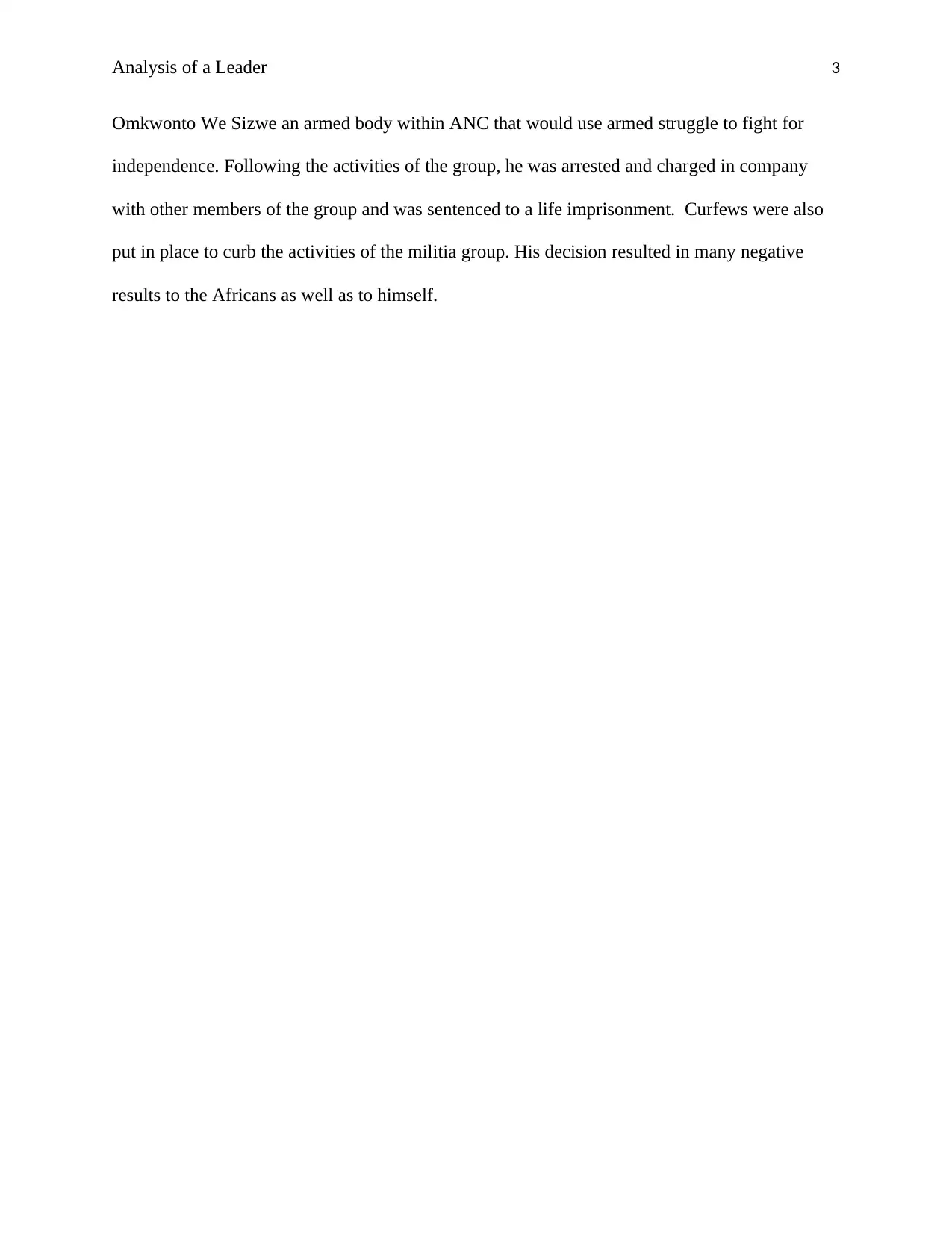
Analysis of a Leader 3
Omkwonto We Sizwe an armed body within ANC that would use armed struggle to fight for
independence. Following the activities of the group, he was arrested and charged in company
with other members of the group and was sentenced to a life imprisonment. Curfews were also
put in place to curb the activities of the militia group. His decision resulted in many negative
results to the Africans as well as to himself.
Omkwonto We Sizwe an armed body within ANC that would use armed struggle to fight for
independence. Following the activities of the group, he was arrested and charged in company
with other members of the group and was sentenced to a life imprisonment. Curfews were also
put in place to curb the activities of the militia group. His decision resulted in many negative
results to the Africans as well as to himself.
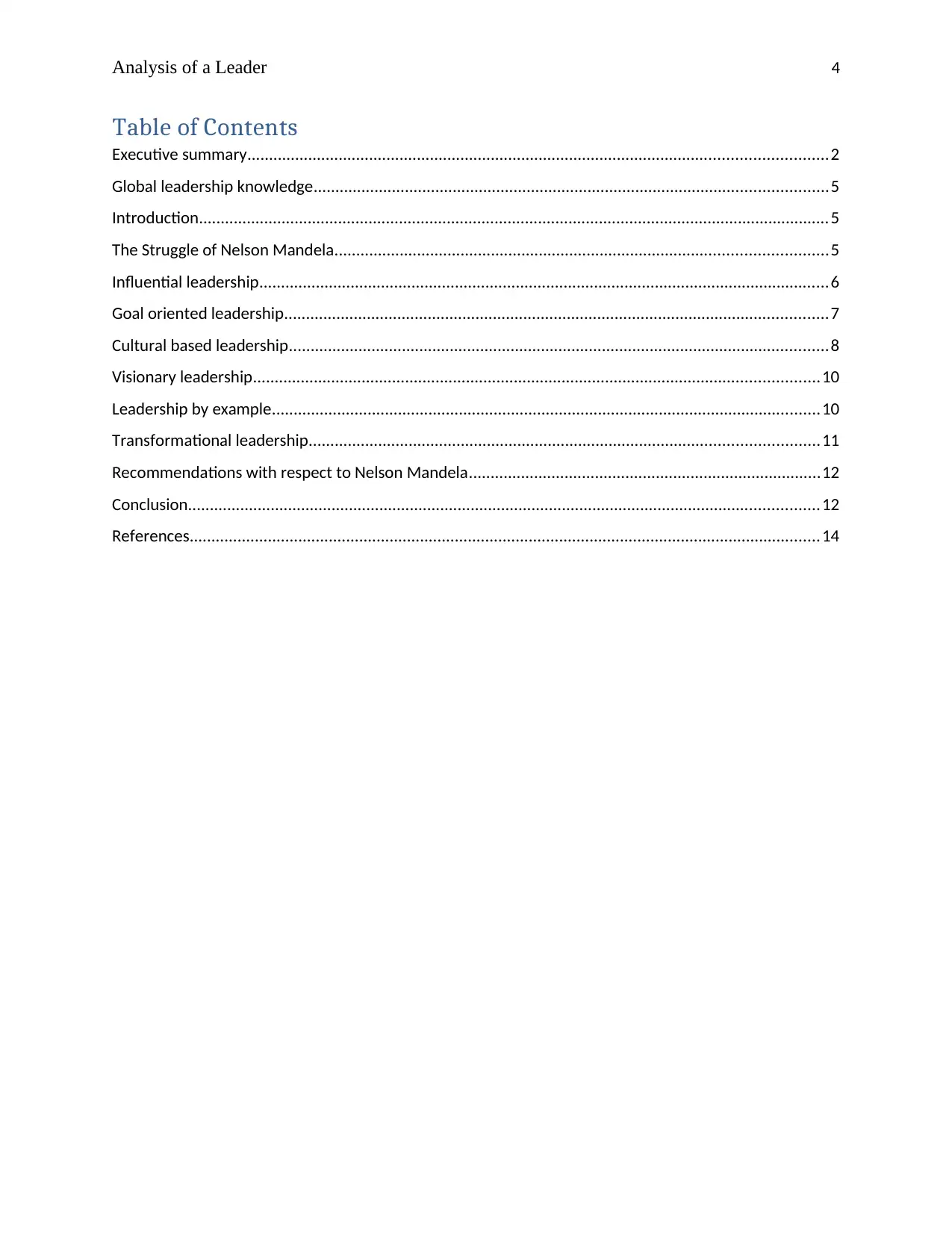
Analysis of a Leader 4
Table of Contents
Executive summary.....................................................................................................................................2
Global leadership knowledge......................................................................................................................5
Introduction.................................................................................................................................................5
The Struggle of Nelson Mandela.................................................................................................................5
Influential leadership...................................................................................................................................6
Goal oriented leadership.............................................................................................................................7
Cultural based leadership............................................................................................................................8
Visionary leadership..................................................................................................................................10
Leadership by example..............................................................................................................................10
Transformational leadership.....................................................................................................................11
Recommendations with respect to Nelson Mandela.................................................................................12
Conclusion.................................................................................................................................................12
References.................................................................................................................................................14
Table of Contents
Executive summary.....................................................................................................................................2
Global leadership knowledge......................................................................................................................5
Introduction.................................................................................................................................................5
The Struggle of Nelson Mandela.................................................................................................................5
Influential leadership...................................................................................................................................6
Goal oriented leadership.............................................................................................................................7
Cultural based leadership............................................................................................................................8
Visionary leadership..................................................................................................................................10
Leadership by example..............................................................................................................................10
Transformational leadership.....................................................................................................................11
Recommendations with respect to Nelson Mandela.................................................................................12
Conclusion.................................................................................................................................................12
References.................................................................................................................................................14
Secure Best Marks with AI Grader
Need help grading? Try our AI Grader for instant feedback on your assignments.
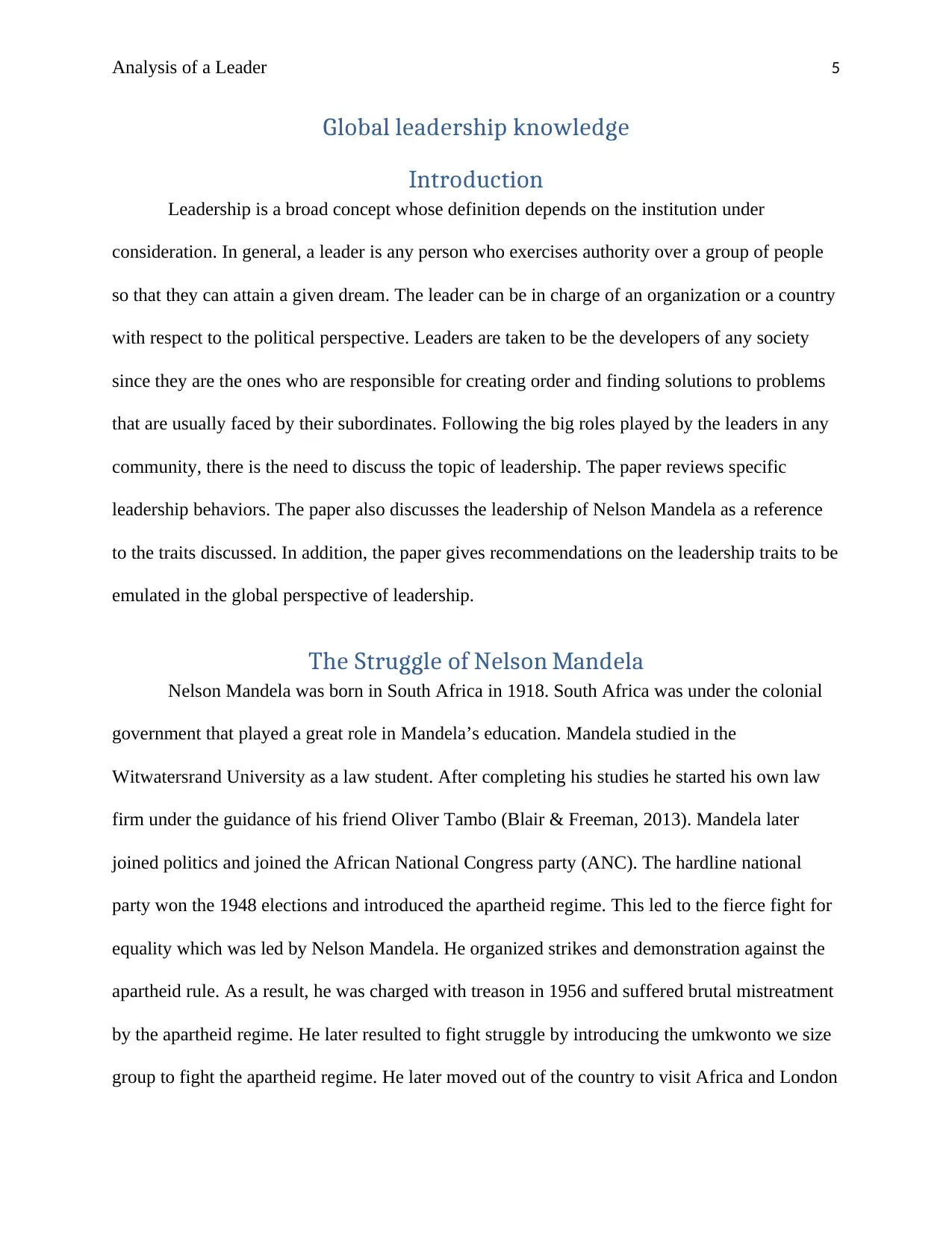
Analysis of a Leader 5
Global leadership knowledge
Introduction
Leadership is a broad concept whose definition depends on the institution under
consideration. In general, a leader is any person who exercises authority over a group of people
so that they can attain a given dream. The leader can be in charge of an organization or a country
with respect to the political perspective. Leaders are taken to be the developers of any society
since they are the ones who are responsible for creating order and finding solutions to problems
that are usually faced by their subordinates. Following the big roles played by the leaders in any
community, there is the need to discuss the topic of leadership. The paper reviews specific
leadership behaviors. The paper also discusses the leadership of Nelson Mandela as a reference
to the traits discussed. In addition, the paper gives recommendations on the leadership traits to be
emulated in the global perspective of leadership.
The Struggle of Nelson Mandela
Nelson Mandela was born in South Africa in 1918. South Africa was under the colonial
government that played a great role in Mandela’s education. Mandela studied in the
Witwatersrand University as a law student. After completing his studies he started his own law
firm under the guidance of his friend Oliver Tambo (Blair & Freeman, 2013). Mandela later
joined politics and joined the African National Congress party (ANC). The hardline national
party won the 1948 elections and introduced the apartheid regime. This led to the fierce fight for
equality which was led by Nelson Mandela. He organized strikes and demonstration against the
apartheid rule. As a result, he was charged with treason in 1956 and suffered brutal mistreatment
by the apartheid regime. He later resulted to fight struggle by introducing the umkwonto we size
group to fight the apartheid regime. He later moved out of the country to visit Africa and London
Global leadership knowledge
Introduction
Leadership is a broad concept whose definition depends on the institution under
consideration. In general, a leader is any person who exercises authority over a group of people
so that they can attain a given dream. The leader can be in charge of an organization or a country
with respect to the political perspective. Leaders are taken to be the developers of any society
since they are the ones who are responsible for creating order and finding solutions to problems
that are usually faced by their subordinates. Following the big roles played by the leaders in any
community, there is the need to discuss the topic of leadership. The paper reviews specific
leadership behaviors. The paper also discusses the leadership of Nelson Mandela as a reference
to the traits discussed. In addition, the paper gives recommendations on the leadership traits to be
emulated in the global perspective of leadership.
The Struggle of Nelson Mandela
Nelson Mandela was born in South Africa in 1918. South Africa was under the colonial
government that played a great role in Mandela’s education. Mandela studied in the
Witwatersrand University as a law student. After completing his studies he started his own law
firm under the guidance of his friend Oliver Tambo (Blair & Freeman, 2013). Mandela later
joined politics and joined the African National Congress party (ANC). The hardline national
party won the 1948 elections and introduced the apartheid regime. This led to the fierce fight for
equality which was led by Nelson Mandela. He organized strikes and demonstration against the
apartheid rule. As a result, he was charged with treason in 1956 and suffered brutal mistreatment
by the apartheid regime. He later resulted to fight struggle by introducing the umkwonto we size
group to fight the apartheid regime. He later moved out of the country to visit Africa and London
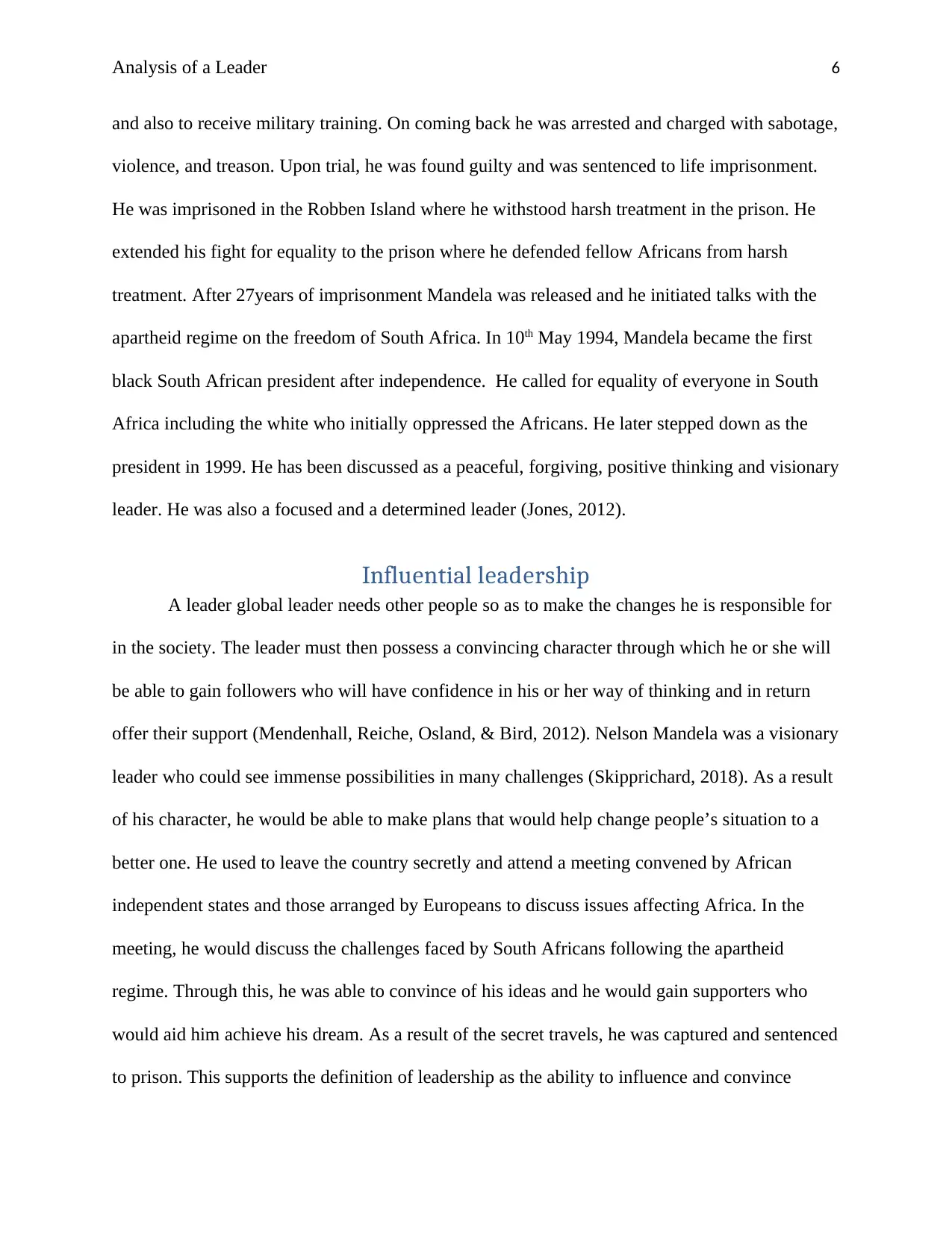
Analysis of a Leader 6
and also to receive military training. On coming back he was arrested and charged with sabotage,
violence, and treason. Upon trial, he was found guilty and was sentenced to life imprisonment.
He was imprisoned in the Robben Island where he withstood harsh treatment in the prison. He
extended his fight for equality to the prison where he defended fellow Africans from harsh
treatment. After 27years of imprisonment Mandela was released and he initiated talks with the
apartheid regime on the freedom of South Africa. In 10th May 1994, Mandela became the first
black South African president after independence. He called for equality of everyone in South
Africa including the white who initially oppressed the Africans. He later stepped down as the
president in 1999. He has been discussed as a peaceful, forgiving, positive thinking and visionary
leader. He was also a focused and a determined leader (Jones, 2012).
Influential leadership
A leader global leader needs other people so as to make the changes he is responsible for
in the society. The leader must then possess a convincing character through which he or she will
be able to gain followers who will have confidence in his or her way of thinking and in return
offer their support (Mendenhall, Reiche, Osland, & Bird, 2012). Nelson Mandela was a visionary
leader who could see immense possibilities in many challenges (Skipprichard, 2018). As a result
of his character, he would be able to make plans that would help change people’s situation to a
better one. He used to leave the country secretly and attend a meeting convened by African
independent states and those arranged by Europeans to discuss issues affecting Africa. In the
meeting, he would discuss the challenges faced by South Africans following the apartheid
regime. Through this, he was able to convince of his ideas and he would gain supporters who
would aid him achieve his dream. As a result of the secret travels, he was captured and sentenced
to prison. This supports the definition of leadership as the ability to influence and convince
and also to receive military training. On coming back he was arrested and charged with sabotage,
violence, and treason. Upon trial, he was found guilty and was sentenced to life imprisonment.
He was imprisoned in the Robben Island where he withstood harsh treatment in the prison. He
extended his fight for equality to the prison where he defended fellow Africans from harsh
treatment. After 27years of imprisonment Mandela was released and he initiated talks with the
apartheid regime on the freedom of South Africa. In 10th May 1994, Mandela became the first
black South African president after independence. He called for equality of everyone in South
Africa including the white who initially oppressed the Africans. He later stepped down as the
president in 1999. He has been discussed as a peaceful, forgiving, positive thinking and visionary
leader. He was also a focused and a determined leader (Jones, 2012).
Influential leadership
A leader global leader needs other people so as to make the changes he is responsible for
in the society. The leader must then possess a convincing character through which he or she will
be able to gain followers who will have confidence in his or her way of thinking and in return
offer their support (Mendenhall, Reiche, Osland, & Bird, 2012). Nelson Mandela was a visionary
leader who could see immense possibilities in many challenges (Skipprichard, 2018). As a result
of his character, he would be able to make plans that would help change people’s situation to a
better one. He used to leave the country secretly and attend a meeting convened by African
independent states and those arranged by Europeans to discuss issues affecting Africa. In the
meeting, he would discuss the challenges faced by South Africans following the apartheid
regime. Through this, he was able to convince of his ideas and he would gain supporters who
would aid him achieve his dream. As a result of the secret travels, he was captured and sentenced
to prison. This supports the definition of leadership as the ability to influence and convince
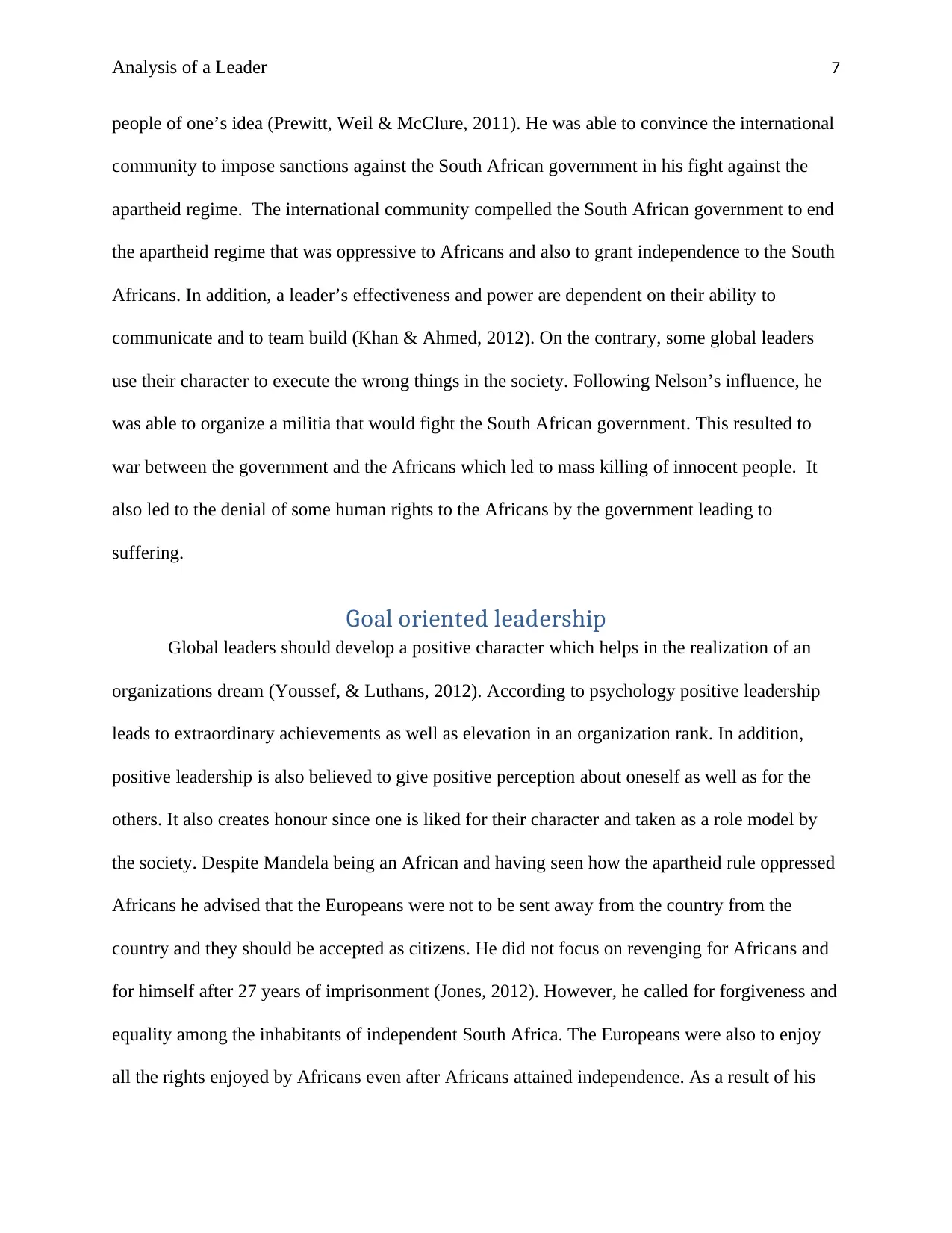
Analysis of a Leader 7
people of one’s idea (Prewitt, Weil & McClure, 2011). He was able to convince the international
community to impose sanctions against the South African government in his fight against the
apartheid regime. The international community compelled the South African government to end
the apartheid regime that was oppressive to Africans and also to grant independence to the South
Africans. In addition, a leader’s effectiveness and power are dependent on their ability to
communicate and to team build (Khan & Ahmed, 2012). On the contrary, some global leaders
use their character to execute the wrong things in the society. Following Nelson’s influence, he
was able to organize a militia that would fight the South African government. This resulted to
war between the government and the Africans which led to mass killing of innocent people. It
also led to the denial of some human rights to the Africans by the government leading to
suffering.
Goal oriented leadership
Global leaders should develop a positive character which helps in the realization of an
organizations dream (Youssef, & Luthans, 2012). According to psychology positive leadership
leads to extraordinary achievements as well as elevation in an organization rank. In addition,
positive leadership is also believed to give positive perception about oneself as well as for the
others. It also creates honour since one is liked for their character and taken as a role model by
the society. Despite Mandela being an African and having seen how the apartheid rule oppressed
Africans he advised that the Europeans were not to be sent away from the country from the
country and they should be accepted as citizens. He did not focus on revenging for Africans and
for himself after 27 years of imprisonment (Jones, 2012). However, he called for forgiveness and
equality among the inhabitants of independent South Africa. The Europeans were also to enjoy
all the rights enjoyed by Africans even after Africans attained independence. As a result of his
people of one’s idea (Prewitt, Weil & McClure, 2011). He was able to convince the international
community to impose sanctions against the South African government in his fight against the
apartheid regime. The international community compelled the South African government to end
the apartheid regime that was oppressive to Africans and also to grant independence to the South
Africans. In addition, a leader’s effectiveness and power are dependent on their ability to
communicate and to team build (Khan & Ahmed, 2012). On the contrary, some global leaders
use their character to execute the wrong things in the society. Following Nelson’s influence, he
was able to organize a militia that would fight the South African government. This resulted to
war between the government and the Africans which led to mass killing of innocent people. It
also led to the denial of some human rights to the Africans by the government leading to
suffering.
Goal oriented leadership
Global leaders should develop a positive character which helps in the realization of an
organizations dream (Youssef, & Luthans, 2012). According to psychology positive leadership
leads to extraordinary achievements as well as elevation in an organization rank. In addition,
positive leadership is also believed to give positive perception about oneself as well as for the
others. It also creates honour since one is liked for their character and taken as a role model by
the society. Despite Mandela being an African and having seen how the apartheid rule oppressed
Africans he advised that the Europeans were not to be sent away from the country from the
country and they should be accepted as citizens. He did not focus on revenging for Africans and
for himself after 27 years of imprisonment (Jones, 2012). However, he called for forgiveness and
equality among the inhabitants of independent South Africa. The Europeans were also to enjoy
all the rights enjoyed by Africans even after Africans attained independence. As a result of his
Paraphrase This Document
Need a fresh take? Get an instant paraphrase of this document with our AI Paraphraser
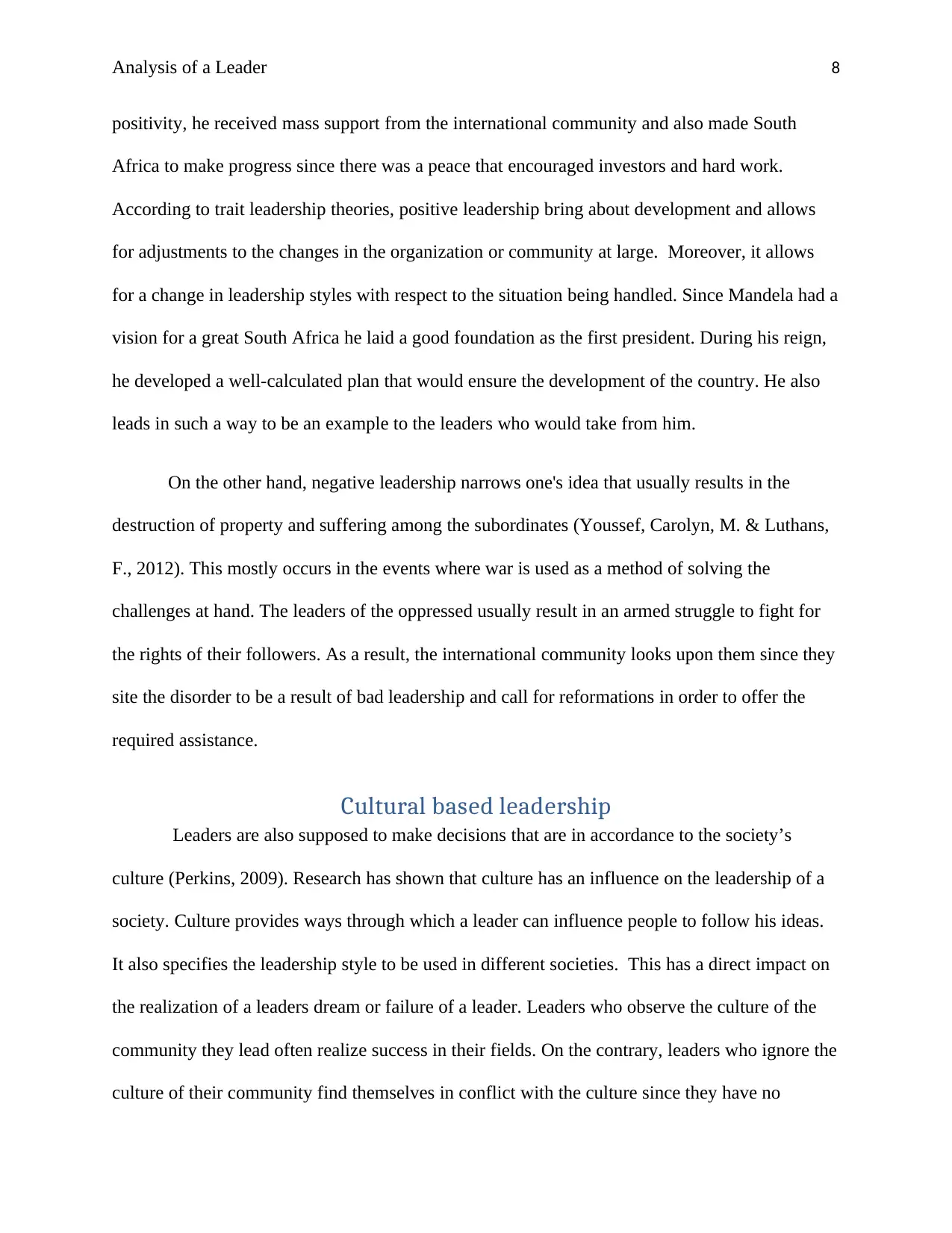
Analysis of a Leader 8
positivity, he received mass support from the international community and also made South
Africa to make progress since there was a peace that encouraged investors and hard work.
According to trait leadership theories, positive leadership bring about development and allows
for adjustments to the changes in the organization or community at large. Moreover, it allows
for a change in leadership styles with respect to the situation being handled. Since Mandela had a
vision for a great South Africa he laid a good foundation as the first president. During his reign,
he developed a well-calculated plan that would ensure the development of the country. He also
leads in such a way to be an example to the leaders who would take from him.
On the other hand, negative leadership narrows one's idea that usually results in the
destruction of property and suffering among the subordinates (Youssef, Carolyn, M. & Luthans,
F., 2012). This mostly occurs in the events where war is used as a method of solving the
challenges at hand. The leaders of the oppressed usually result in an armed struggle to fight for
the rights of their followers. As a result, the international community looks upon them since they
site the disorder to be a result of bad leadership and call for reformations in order to offer the
required assistance.
Cultural based leadership
Leaders are also supposed to make decisions that are in accordance to the society’s
culture (Perkins, 2009). Research has shown that culture has an influence on the leadership of a
society. Culture provides ways through which a leader can influence people to follow his ideas.
It also specifies the leadership style to be used in different societies. This has a direct impact on
the realization of a leaders dream or failure of a leader. Leaders who observe the culture of the
community they lead often realize success in their fields. On the contrary, leaders who ignore the
culture of their community find themselves in conflict with the culture since they have no
positivity, he received mass support from the international community and also made South
Africa to make progress since there was a peace that encouraged investors and hard work.
According to trait leadership theories, positive leadership bring about development and allows
for adjustments to the changes in the organization or community at large. Moreover, it allows
for a change in leadership styles with respect to the situation being handled. Since Mandela had a
vision for a great South Africa he laid a good foundation as the first president. During his reign,
he developed a well-calculated plan that would ensure the development of the country. He also
leads in such a way to be an example to the leaders who would take from him.
On the other hand, negative leadership narrows one's idea that usually results in the
destruction of property and suffering among the subordinates (Youssef, Carolyn, M. & Luthans,
F., 2012). This mostly occurs in the events where war is used as a method of solving the
challenges at hand. The leaders of the oppressed usually result in an armed struggle to fight for
the rights of their followers. As a result, the international community looks upon them since they
site the disorder to be a result of bad leadership and call for reformations in order to offer the
required assistance.
Cultural based leadership
Leaders are also supposed to make decisions that are in accordance to the society’s
culture (Perkins, 2009). Research has shown that culture has an influence on the leadership of a
society. Culture provides ways through which a leader can influence people to follow his ideas.
It also specifies the leadership style to be used in different societies. This has a direct impact on
the realization of a leaders dream or failure of a leader. Leaders who observe the culture of the
community they lead often realize success in their fields. On the contrary, leaders who ignore the
culture of their community find themselves in conflict with the culture since they have no
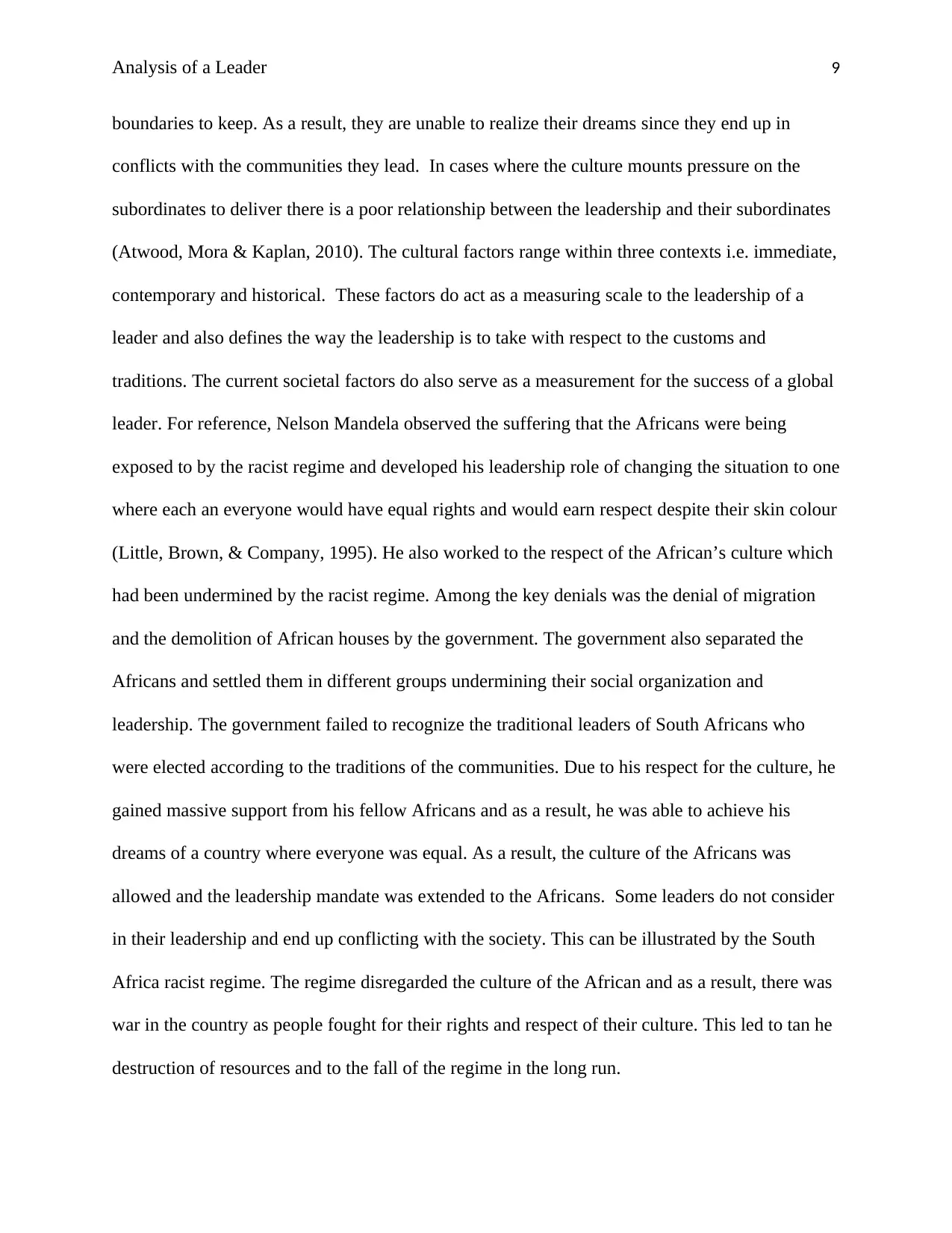
Analysis of a Leader 9
boundaries to keep. As a result, they are unable to realize their dreams since they end up in
conflicts with the communities they lead. In cases where the culture mounts pressure on the
subordinates to deliver there is a poor relationship between the leadership and their subordinates
(Atwood, Mora & Kaplan, 2010). The cultural factors range within three contexts i.e. immediate,
contemporary and historical. These factors do act as a measuring scale to the leadership of a
leader and also defines the way the leadership is to take with respect to the customs and
traditions. The current societal factors do also serve as a measurement for the success of a global
leader. For reference, Nelson Mandela observed the suffering that the Africans were being
exposed to by the racist regime and developed his leadership role of changing the situation to one
where each an everyone would have equal rights and would earn respect despite their skin colour
(Little, Brown, & Company, 1995). He also worked to the respect of the African’s culture which
had been undermined by the racist regime. Among the key denials was the denial of migration
and the demolition of African houses by the government. The government also separated the
Africans and settled them in different groups undermining their social organization and
leadership. The government failed to recognize the traditional leaders of South Africans who
were elected according to the traditions of the communities. Due to his respect for the culture, he
gained massive support from his fellow Africans and as a result, he was able to achieve his
dreams of a country where everyone was equal. As a result, the culture of the Africans was
allowed and the leadership mandate was extended to the Africans. Some leaders do not consider
in their leadership and end up conflicting with the society. This can be illustrated by the South
Africa racist regime. The regime disregarded the culture of the African and as a result, there was
war in the country as people fought for their rights and respect of their culture. This led to tan he
destruction of resources and to the fall of the regime in the long run.
boundaries to keep. As a result, they are unable to realize their dreams since they end up in
conflicts with the communities they lead. In cases where the culture mounts pressure on the
subordinates to deliver there is a poor relationship between the leadership and their subordinates
(Atwood, Mora & Kaplan, 2010). The cultural factors range within three contexts i.e. immediate,
contemporary and historical. These factors do act as a measuring scale to the leadership of a
leader and also defines the way the leadership is to take with respect to the customs and
traditions. The current societal factors do also serve as a measurement for the success of a global
leader. For reference, Nelson Mandela observed the suffering that the Africans were being
exposed to by the racist regime and developed his leadership role of changing the situation to one
where each an everyone would have equal rights and would earn respect despite their skin colour
(Little, Brown, & Company, 1995). He also worked to the respect of the African’s culture which
had been undermined by the racist regime. Among the key denials was the denial of migration
and the demolition of African houses by the government. The government also separated the
Africans and settled them in different groups undermining their social organization and
leadership. The government failed to recognize the traditional leaders of South Africans who
were elected according to the traditions of the communities. Due to his respect for the culture, he
gained massive support from his fellow Africans and as a result, he was able to achieve his
dreams of a country where everyone was equal. As a result, the culture of the Africans was
allowed and the leadership mandate was extended to the Africans. Some leaders do not consider
in their leadership and end up conflicting with the society. This can be illustrated by the South
Africa racist regime. The regime disregarded the culture of the African and as a result, there was
war in the country as people fought for their rights and respect of their culture. This led to tan he
destruction of resources and to the fall of the regime in the long run.
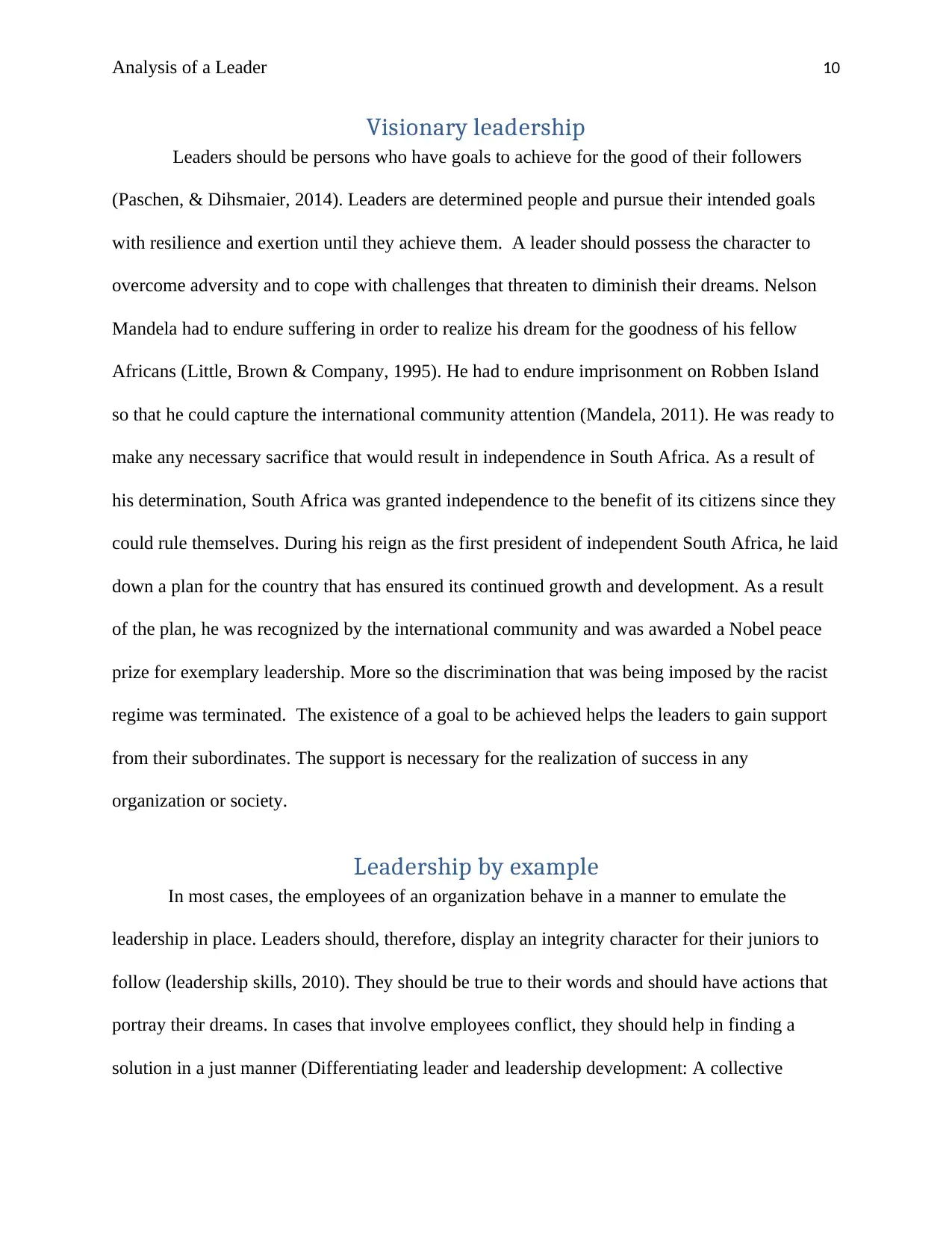
Analysis of a Leader 10
Visionary leadership
Leaders should be persons who have goals to achieve for the good of their followers
(Paschen, & Dihsmaier, 2014). Leaders are determined people and pursue their intended goals
with resilience and exertion until they achieve them. A leader should possess the character to
overcome adversity and to cope with challenges that threaten to diminish their dreams. Nelson
Mandela had to endure suffering in order to realize his dream for the goodness of his fellow
Africans (Little, Brown & Company, 1995). He had to endure imprisonment on Robben Island
so that he could capture the international community attention (Mandela, 2011). He was ready to
make any necessary sacrifice that would result in independence in South Africa. As a result of
his determination, South Africa was granted independence to the benefit of its citizens since they
could rule themselves. During his reign as the first president of independent South Africa, he laid
down a plan for the country that has ensured its continued growth and development. As a result
of the plan, he was recognized by the international community and was awarded a Nobel peace
prize for exemplary leadership. More so the discrimination that was being imposed by the racist
regime was terminated. The existence of a goal to be achieved helps the leaders to gain support
from their subordinates. The support is necessary for the realization of success in any
organization or society.
Leadership by example
In most cases, the employees of an organization behave in a manner to emulate the
leadership in place. Leaders should, therefore, display an integrity character for their juniors to
follow (leadership skills, 2010). They should be true to their words and should have actions that
portray their dreams. In cases that involve employees conflict, they should help in finding a
solution in a just manner (Differentiating leader and leadership development: A collective
Visionary leadership
Leaders should be persons who have goals to achieve for the good of their followers
(Paschen, & Dihsmaier, 2014). Leaders are determined people and pursue their intended goals
with resilience and exertion until they achieve them. A leader should possess the character to
overcome adversity and to cope with challenges that threaten to diminish their dreams. Nelson
Mandela had to endure suffering in order to realize his dream for the goodness of his fellow
Africans (Little, Brown & Company, 1995). He had to endure imprisonment on Robben Island
so that he could capture the international community attention (Mandela, 2011). He was ready to
make any necessary sacrifice that would result in independence in South Africa. As a result of
his determination, South Africa was granted independence to the benefit of its citizens since they
could rule themselves. During his reign as the first president of independent South Africa, he laid
down a plan for the country that has ensured its continued growth and development. As a result
of the plan, he was recognized by the international community and was awarded a Nobel peace
prize for exemplary leadership. More so the discrimination that was being imposed by the racist
regime was terminated. The existence of a goal to be achieved helps the leaders to gain support
from their subordinates. The support is necessary for the realization of success in any
organization or society.
Leadership by example
In most cases, the employees of an organization behave in a manner to emulate the
leadership in place. Leaders should, therefore, display an integrity character for their juniors to
follow (leadership skills, 2010). They should be true to their words and should have actions that
portray their dreams. In cases that involve employees conflict, they should help in finding a
solution in a just manner (Differentiating leader and leadership development: A collective
Secure Best Marks with AI Grader
Need help grading? Try our AI Grader for instant feedback on your assignments.
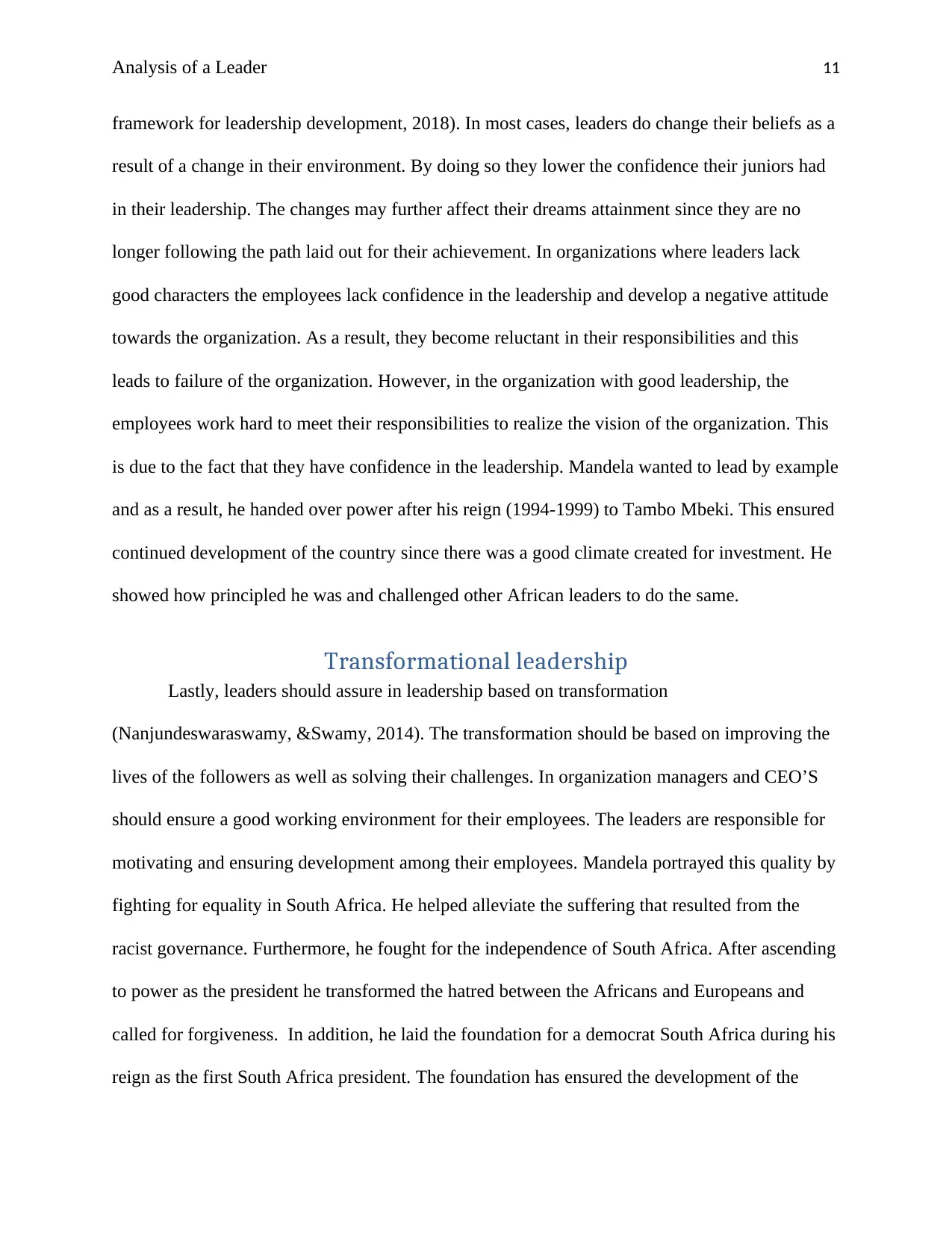
Analysis of a Leader 11
framework for leadership development, 2018). In most cases, leaders do change their beliefs as a
result of a change in their environment. By doing so they lower the confidence their juniors had
in their leadership. The changes may further affect their dreams attainment since they are no
longer following the path laid out for their achievement. In organizations where leaders lack
good characters the employees lack confidence in the leadership and develop a negative attitude
towards the organization. As a result, they become reluctant in their responsibilities and this
leads to failure of the organization. However, in the organization with good leadership, the
employees work hard to meet their responsibilities to realize the vision of the organization. This
is due to the fact that they have confidence in the leadership. Mandela wanted to lead by example
and as a result, he handed over power after his reign (1994-1999) to Tambo Mbeki. This ensured
continued development of the country since there was a good climate created for investment. He
showed how principled he was and challenged other African leaders to do the same.
Transformational leadership
Lastly, leaders should assure in leadership based on transformation
(Nanjundeswaraswamy, &Swamy, 2014). The transformation should be based on improving the
lives of the followers as well as solving their challenges. In organization managers and CEO’S
should ensure a good working environment for their employees. The leaders are responsible for
motivating and ensuring development among their employees. Mandela portrayed this quality by
fighting for equality in South Africa. He helped alleviate the suffering that resulted from the
racist governance. Furthermore, he fought for the independence of South Africa. After ascending
to power as the president he transformed the hatred between the Africans and Europeans and
called for forgiveness. In addition, he laid the foundation for a democrat South Africa during his
reign as the first South Africa president. The foundation has ensured the development of the
framework for leadership development, 2018). In most cases, leaders do change their beliefs as a
result of a change in their environment. By doing so they lower the confidence their juniors had
in their leadership. The changes may further affect their dreams attainment since they are no
longer following the path laid out for their achievement. In organizations where leaders lack
good characters the employees lack confidence in the leadership and develop a negative attitude
towards the organization. As a result, they become reluctant in their responsibilities and this
leads to failure of the organization. However, in the organization with good leadership, the
employees work hard to meet their responsibilities to realize the vision of the organization. This
is due to the fact that they have confidence in the leadership. Mandela wanted to lead by example
and as a result, he handed over power after his reign (1994-1999) to Tambo Mbeki. This ensured
continued development of the country since there was a good climate created for investment. He
showed how principled he was and challenged other African leaders to do the same.
Transformational leadership
Lastly, leaders should assure in leadership based on transformation
(Nanjundeswaraswamy, &Swamy, 2014). The transformation should be based on improving the
lives of the followers as well as solving their challenges. In organization managers and CEO’S
should ensure a good working environment for their employees. The leaders are responsible for
motivating and ensuring development among their employees. Mandela portrayed this quality by
fighting for equality in South Africa. He helped alleviate the suffering that resulted from the
racist governance. Furthermore, he fought for the independence of South Africa. After ascending
to power as the president he transformed the hatred between the Africans and Europeans and
called for forgiveness. In addition, he laid the foundation for a democrat South Africa during his
reign as the first South Africa president. The foundation has ensured the development of the
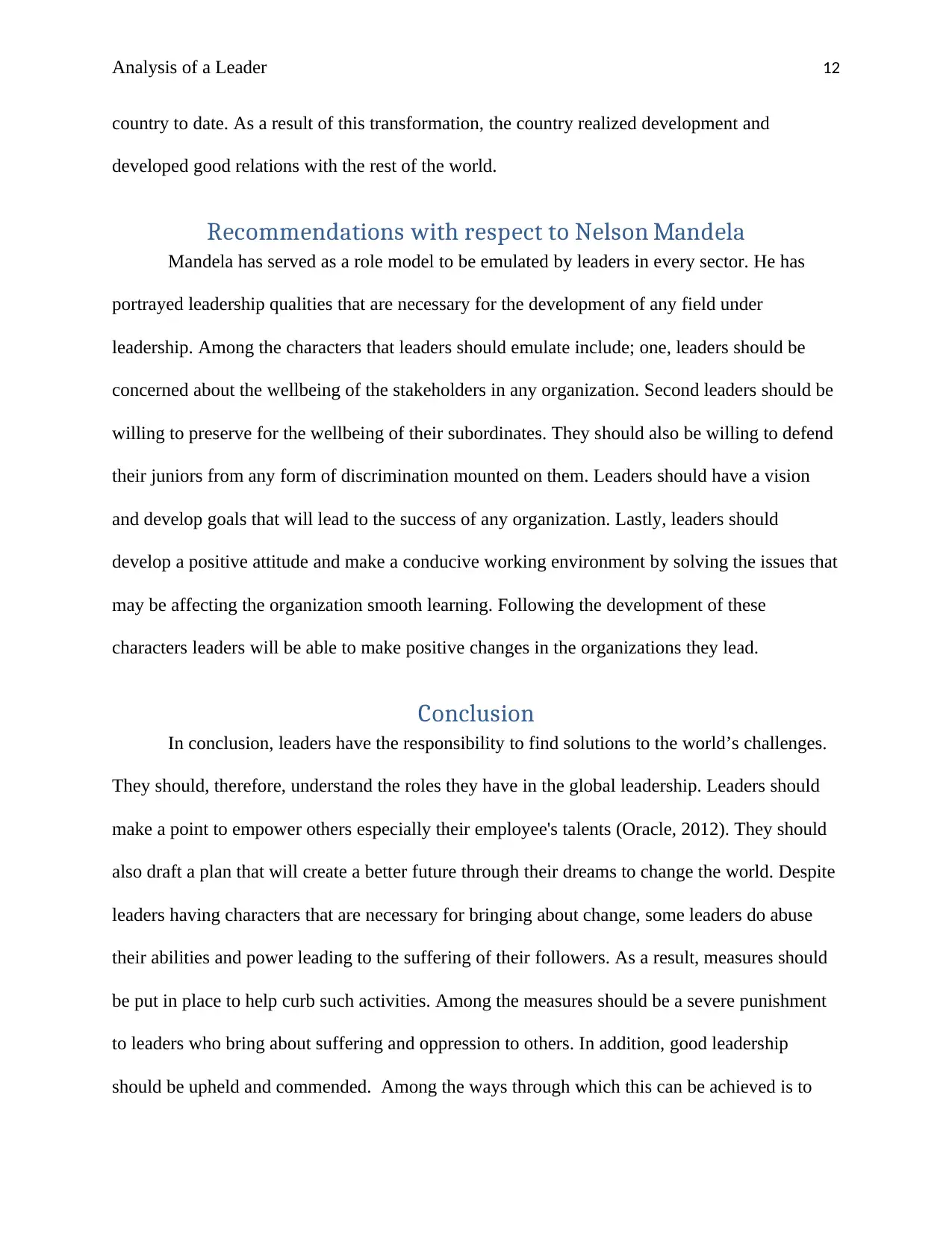
Analysis of a Leader 12
country to date. As a result of this transformation, the country realized development and
developed good relations with the rest of the world.
Recommendations with respect to Nelson Mandela
Mandela has served as a role model to be emulated by leaders in every sector. He has
portrayed leadership qualities that are necessary for the development of any field under
leadership. Among the characters that leaders should emulate include; one, leaders should be
concerned about the wellbeing of the stakeholders in any organization. Second leaders should be
willing to preserve for the wellbeing of their subordinates. They should also be willing to defend
their juniors from any form of discrimination mounted on them. Leaders should have a vision
and develop goals that will lead to the success of any organization. Lastly, leaders should
develop a positive attitude and make a conducive working environment by solving the issues that
may be affecting the organization smooth learning. Following the development of these
characters leaders will be able to make positive changes in the organizations they lead.
Conclusion
In conclusion, leaders have the responsibility to find solutions to the world’s challenges.
They should, therefore, understand the roles they have in the global leadership. Leaders should
make a point to empower others especially their employee's talents (Oracle, 2012). They should
also draft a plan that will create a better future through their dreams to change the world. Despite
leaders having characters that are necessary for bringing about change, some leaders do abuse
their abilities and power leading to the suffering of their followers. As a result, measures should
be put in place to help curb such activities. Among the measures should be a severe punishment
to leaders who bring about suffering and oppression to others. In addition, good leadership
should be upheld and commended. Among the ways through which this can be achieved is to
country to date. As a result of this transformation, the country realized development and
developed good relations with the rest of the world.
Recommendations with respect to Nelson Mandela
Mandela has served as a role model to be emulated by leaders in every sector. He has
portrayed leadership qualities that are necessary for the development of any field under
leadership. Among the characters that leaders should emulate include; one, leaders should be
concerned about the wellbeing of the stakeholders in any organization. Second leaders should be
willing to preserve for the wellbeing of their subordinates. They should also be willing to defend
their juniors from any form of discrimination mounted on them. Leaders should have a vision
and develop goals that will lead to the success of any organization. Lastly, leaders should
develop a positive attitude and make a conducive working environment by solving the issues that
may be affecting the organization smooth learning. Following the development of these
characters leaders will be able to make positive changes in the organizations they lead.
Conclusion
In conclusion, leaders have the responsibility to find solutions to the world’s challenges.
They should, therefore, understand the roles they have in the global leadership. Leaders should
make a point to empower others especially their employee's talents (Oracle, 2012). They should
also draft a plan that will create a better future through their dreams to change the world. Despite
leaders having characters that are necessary for bringing about change, some leaders do abuse
their abilities and power leading to the suffering of their followers. As a result, measures should
be put in place to help curb such activities. Among the measures should be a severe punishment
to leaders who bring about suffering and oppression to others. In addition, good leadership
should be upheld and commended. Among the ways through which this can be achieved is to
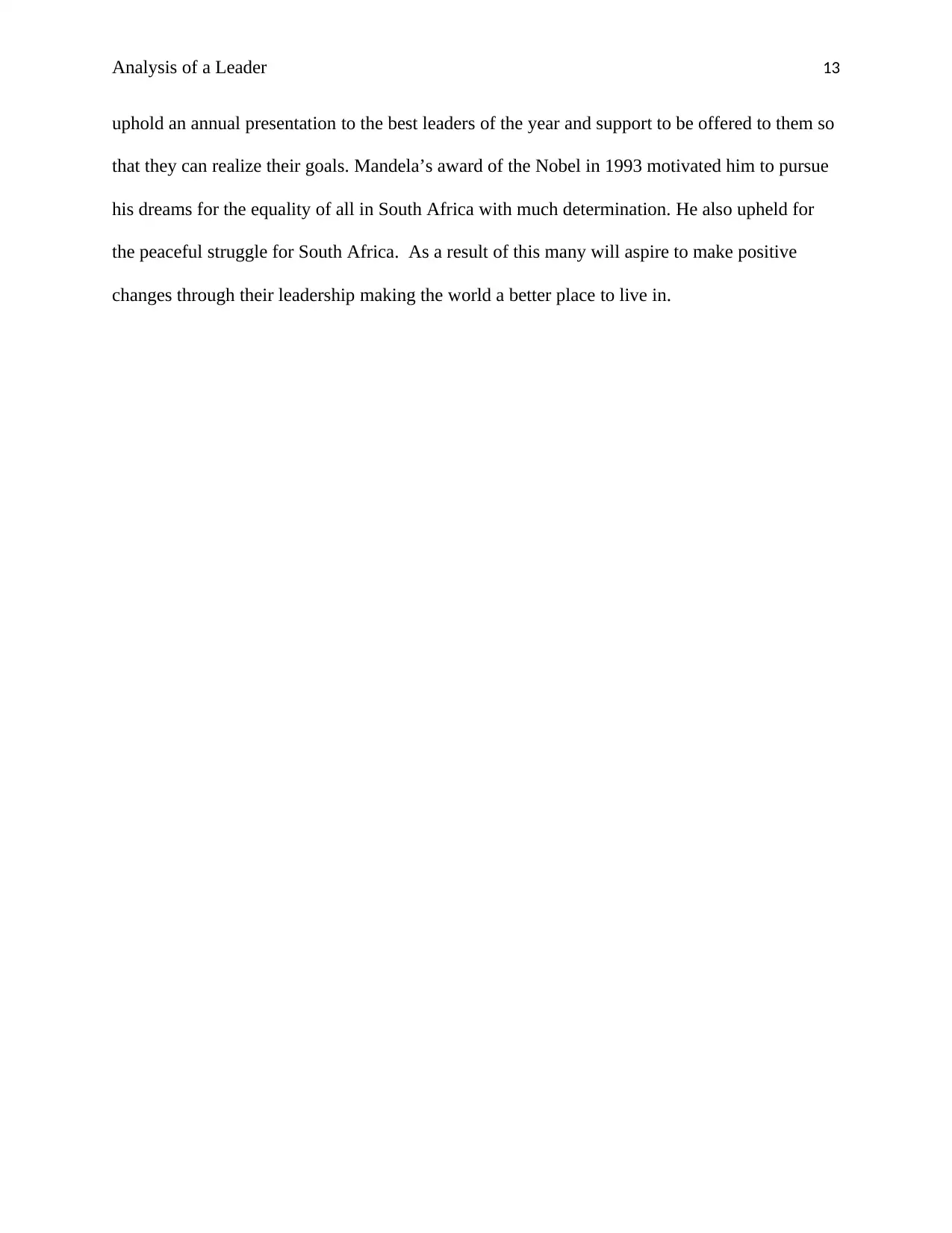
Analysis of a Leader 13
uphold an annual presentation to the best leaders of the year and support to be offered to them so
that they can realize their goals. Mandela’s award of the Nobel in 1993 motivated him to pursue
his dreams for the equality of all in South Africa with much determination. He also upheld for
the peaceful struggle for South Africa. As a result of this many will aspire to make positive
changes through their leadership making the world a better place to live in.
uphold an annual presentation to the best leaders of the year and support to be offered to them so
that they can realize their goals. Mandela’s award of the Nobel in 1993 motivated him to pursue
his dreams for the equality of all in South Africa with much determination. He also upheld for
the peaceful struggle for South Africa. As a result of this many will aspire to make positive
changes through their leadership making the world a better place to live in.
Paraphrase This Document
Need a fresh take? Get an instant paraphrase of this document with our AI Paraphraser
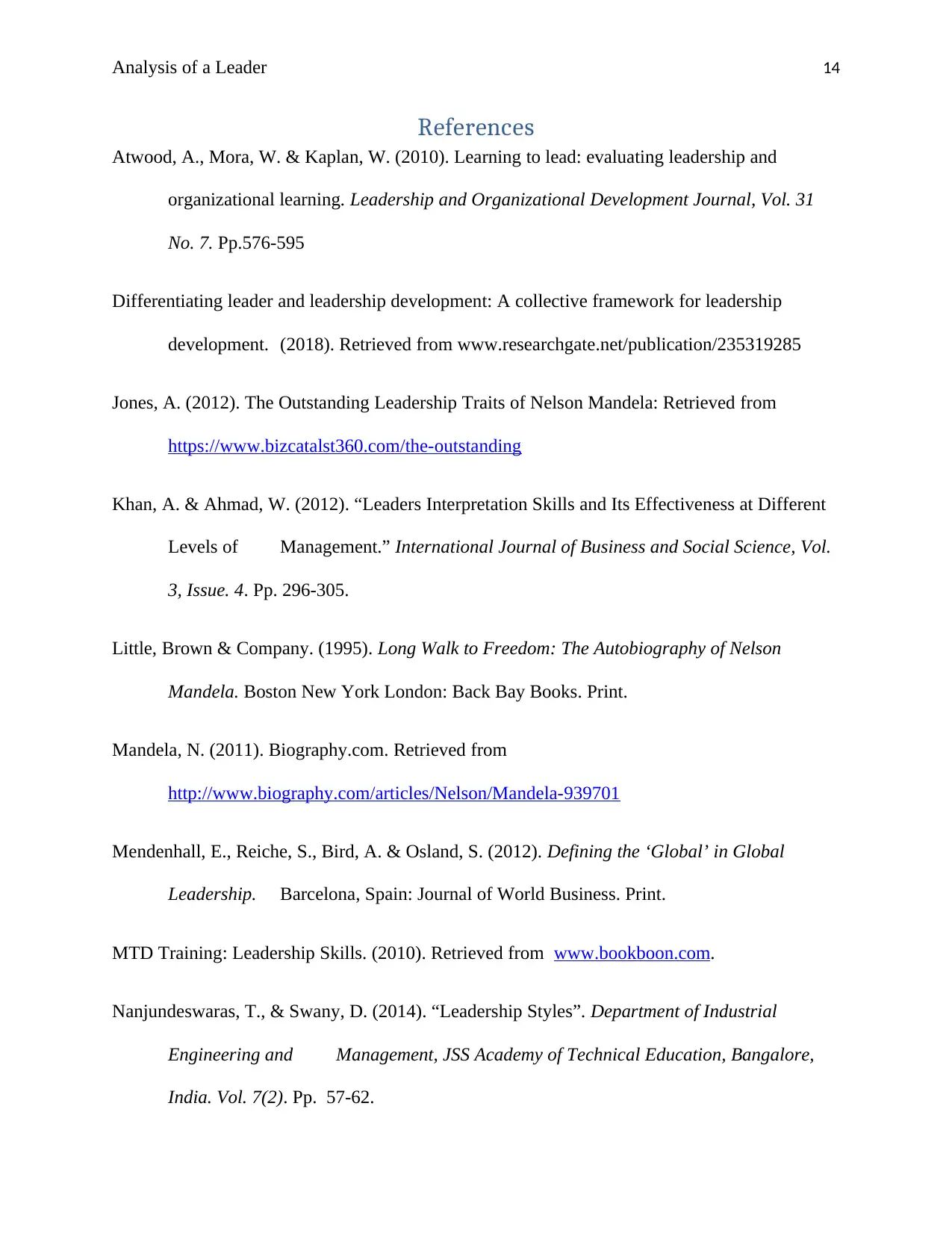
Analysis of a Leader 14
References
Atwood, A., Mora, W. & Kaplan, W. (2010). Learning to lead: evaluating leadership and
organizational learning. Leadership and Organizational Development Journal, Vol. 31
No. 7. Pp.576-595
Differentiating leader and leadership development: A collective framework for leadership
development. (2018). Retrieved from www.researchgate.net/publication/235319285
Jones, A. (2012). The Outstanding Leadership Traits of Nelson Mandela: Retrieved from
https://www.bizcatalst360.com/the-outstanding
Khan, A. & Ahmad, W. (2012). “Leaders Interpretation Skills and Its Effectiveness at Different
Levels of Management.” International Journal of Business and Social Science, Vol.
3, Issue. 4. Pp. 296-305.
Little, Brown & Company. (1995). Long Walk to Freedom: The Autobiography of Nelson
Mandela. Boston New York London: Back Bay Books. Print.
Mandela, N. (2011). Biography.com. Retrieved from
http://www.biography.com/articles/Nelson/Mandela-939701
Mendenhall, E., Reiche, S., Bird, A. & Osland, S. (2012). Defining the ‘Global’ in Global
Leadership. Barcelona, Spain: Journal of World Business. Print.
MTD Training: Leadership Skills. (2010). Retrieved from www.bookboon.com.
Nanjundeswaras, T., & Swany, D. (2014). “Leadership Styles”. Department of Industrial
Engineering and Management, JSS Academy of Technical Education, Bangalore,
India. Vol. 7(2). Pp. 57-62.
References
Atwood, A., Mora, W. & Kaplan, W. (2010). Learning to lead: evaluating leadership and
organizational learning. Leadership and Organizational Development Journal, Vol. 31
No. 7. Pp.576-595
Differentiating leader and leadership development: A collective framework for leadership
development. (2018). Retrieved from www.researchgate.net/publication/235319285
Jones, A. (2012). The Outstanding Leadership Traits of Nelson Mandela: Retrieved from
https://www.bizcatalst360.com/the-outstanding
Khan, A. & Ahmad, W. (2012). “Leaders Interpretation Skills and Its Effectiveness at Different
Levels of Management.” International Journal of Business and Social Science, Vol.
3, Issue. 4. Pp. 296-305.
Little, Brown & Company. (1995). Long Walk to Freedom: The Autobiography of Nelson
Mandela. Boston New York London: Back Bay Books. Print.
Mandela, N. (2011). Biography.com. Retrieved from
http://www.biography.com/articles/Nelson/Mandela-939701
Mendenhall, E., Reiche, S., Bird, A. & Osland, S. (2012). Defining the ‘Global’ in Global
Leadership. Barcelona, Spain: Journal of World Business. Print.
MTD Training: Leadership Skills. (2010). Retrieved from www.bookboon.com.
Nanjundeswaras, T., & Swany, D. (2014). “Leadership Styles”. Department of Industrial
Engineering and Management, JSS Academy of Technical Education, Bangalore,
India. Vol. 7(2). Pp. 57-62.
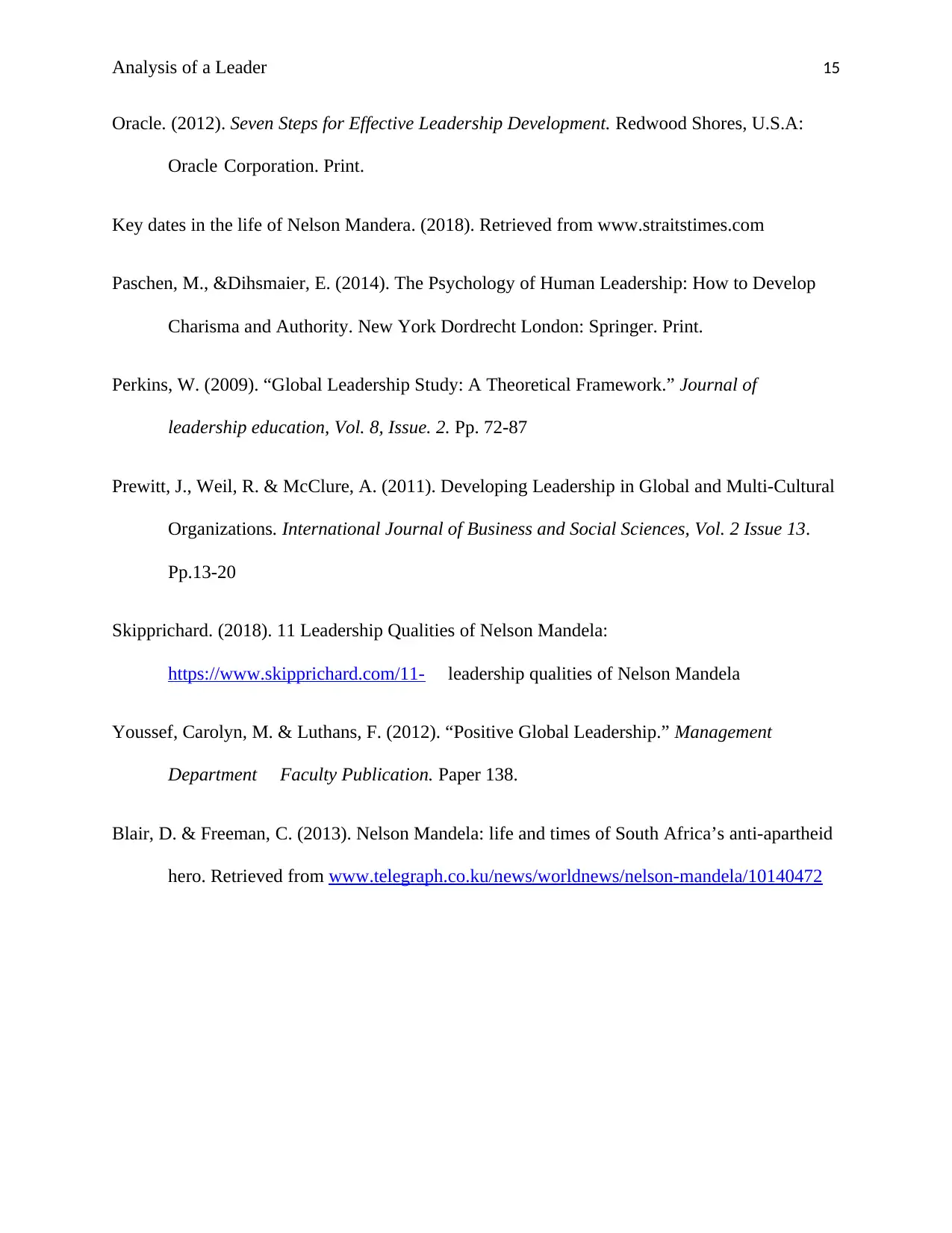
Analysis of a Leader 15
Oracle. (2012). Seven Steps for Effective Leadership Development. Redwood Shores, U.S.A:
Oracle Corporation. Print.
Key dates in the life of Nelson Mandera. (2018). Retrieved from www.straitstimes.com
Paschen, M., &Dihsmaier, E. (2014). The Psychology of Human Leadership: How to Develop
Charisma and Authority. New York Dordrecht London: Springer. Print.
Perkins, W. (2009). “Global Leadership Study: A Theoretical Framework.” Journal of
leadership education, Vol. 8, Issue. 2. Pp. 72-87
Prewitt, J., Weil, R. & McClure, A. (2011). Developing Leadership in Global and Multi-Cultural
Organizations. International Journal of Business and Social Sciences, Vol. 2 Issue 13.
Pp.13-20
Skipprichard. (2018). 11 Leadership Qualities of Nelson Mandela:
https://www.skipprichard.com/11- leadership qualities of Nelson Mandela
Youssef, Carolyn, M. & Luthans, F. (2012). “Positive Global Leadership.” Management
Department Faculty Publication. Paper 138.
Blair, D. & Freeman, C. (2013). Nelson Mandela: life and times of South Africa’s anti-apartheid
hero. Retrieved from www.telegraph.co.ku/news/worldnews/nelson-mandela/10140472
Oracle. (2012). Seven Steps for Effective Leadership Development. Redwood Shores, U.S.A:
Oracle Corporation. Print.
Key dates in the life of Nelson Mandera. (2018). Retrieved from www.straitstimes.com
Paschen, M., &Dihsmaier, E. (2014). The Psychology of Human Leadership: How to Develop
Charisma and Authority. New York Dordrecht London: Springer. Print.
Perkins, W. (2009). “Global Leadership Study: A Theoretical Framework.” Journal of
leadership education, Vol. 8, Issue. 2. Pp. 72-87
Prewitt, J., Weil, R. & McClure, A. (2011). Developing Leadership in Global and Multi-Cultural
Organizations. International Journal of Business and Social Sciences, Vol. 2 Issue 13.
Pp.13-20
Skipprichard. (2018). 11 Leadership Qualities of Nelson Mandela:
https://www.skipprichard.com/11- leadership qualities of Nelson Mandela
Youssef, Carolyn, M. & Luthans, F. (2012). “Positive Global Leadership.” Management
Department Faculty Publication. Paper 138.
Blair, D. & Freeman, C. (2013). Nelson Mandela: life and times of South Africa’s anti-apartheid
hero. Retrieved from www.telegraph.co.ku/news/worldnews/nelson-mandela/10140472

Analysis of a Leader 16
1 out of 16
Related Documents
Your All-in-One AI-Powered Toolkit for Academic Success.
+13062052269
info@desklib.com
Available 24*7 on WhatsApp / Email
![[object Object]](/_next/static/media/star-bottom.7253800d.svg)
Unlock your academic potential
© 2024 | Zucol Services PVT LTD | All rights reserved.





